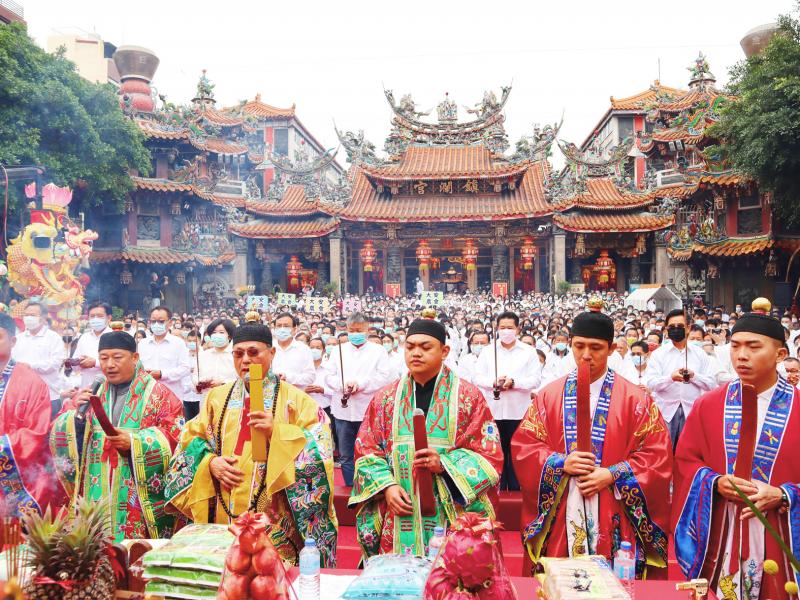Water levels in many of the nation’s reservoirs remain low, despite a weather system dumping significant rain in northern Taiwan last week.
Several major reservoirs in central and southern Taiwan, where the water shortage has been the most serious, were still at low capacity yesterday, Water Resources Agency (WRA) data showed.
As of 10am, the Baoshan Second Reservoir (寶二水庫), which provides water for the Hsinchu Science Park, was at 12 percent capacity.

Photo: Ou Su-mei, Taipei Times
Liyutan Reservoir (鯉魚潭水庫), which supplies water for Taichung and Miaoli County, and Zengwen Reservoir (曾文水庫) in Tainan, Taiwan’s largest reservoir, were at 15 percent respectively, the data showed.
Meanwhile, two major reservoirs in the north — Feitsui Reservoir (翡翠水庫) in New Taipei City and Shihmen Reservoir (石門水庫) in Taoyuan — were at 88 and 49 percent respectively, the data showed.
To cope with the drought, tap water pressure in Hsinchu County, Miaoli and Taichung has been lowered, and water would be trucked from Taoyuan to Hsinchu, the agency said.
Science and industrial parks in areas with no risk of land subsidence would be allowed to drill temporary wells, it said.
The wells would be sealed once the drought ends, WRA Deputy Director-General Wang Yi-feng (王藝峰) said.
However, former minister of economic affairs Yiin Chii-ming (尹啟銘) said that drilling wells might not help solve the issue, as groundwater levels fall during droughts, local Chinese-language media reported.
To appeal to higher powers amid the drought, the Irrigation Agency yesterday held a rain prayer ceremony at the Jenn Lann Temple (鎮瀾宮) in Taichung’s Dajia District (大甲), one of the nation’s largest temples where the sea goddess Matsu (媽祖) is worshiped.

NEW IDENTITY: Known for its software, India has expanded into hardware, with its semiconductor industry growing from US$38bn in 2023 to US$45bn to US$50bn India on Saturday inaugurated its first semiconductor assembly and test facility, a milestone in the government’s push to reduce dependence on foreign chipmakers and stake a claim in a sector dominated by China. Indian Prime Minister Narendra Modi opened US firm Micron Technology Inc’s semiconductor assembly, test and packaging unit in his home state of Gujarat, hailing the “dawn of a new era” for India’s technology ambitions. “When young Indians look back in the future, they will see this decade as the turning point in our tech future,” Modi told the event, which was broadcast on his YouTube channel. The plant would convert

‘SEISMIC SHIFT’: The researcher forecast there would be about 1.1 billion mobile shipments this year, down from 1.26 billion the prior year and erasing years of gains The global smartphone market is expected to contract 12.9 percent this year due to the unprecedented memorychip shortage, marking “a crisis like no other,” researcher International Data Corp (IDC) said. The new forecast, a dramatic revision down from earlier estimates, gives the latest accounting of the ongoing memory crunch that is affecting every corner of the electronics industry. The demand for advanced memory to power artificial intelligence (AI) tasks has drained global supply until well into next year and jeopardizes the business model of many smartphone makers. IDC forecast about 1.1 billion mobile shipments this year, down from 1.26 billion the prior

People stand in a Pokemon store in Tokyo on Thursday. One of the world highest-grossing franchises is celebrated its 30th anniversary yesterday.

Zimbabwe’s ban on raw lithium exports is forcing Chinese miners to rethink their strategy, speeding up plans to process the metal locally instead of shipping it to China’s vast rechargeable battery industry. The country is Africa’s largest lithium producer and has one of the world’s largest reserves, according to the US Geological Survey (USGS). Zimbabwe already banned the export of lithium ore in 2022 and last year announced it would halt exports of lithium concentrates from January next year. However, on Wednesday it imposed the ban with immediate effect, leaving unclear what the lithium mining sector would do in the